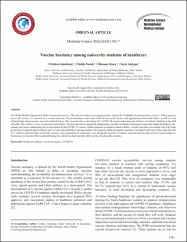Vaccine hesitancy among university students of healthcare

Göster/
Erişim
info:eu-repo/semantics/openAccesshttp://creativecommons.org/licenses/by-nc-nd/3.0/us/Tarih
2022Üst veri
Tüm öğe kaydını gösterÖzet
The World Health Organization defines vaccine hesitancy as "the refusal or delay in accepting vaccines despite the availability of immunization services." When a person
rejects all vaccines, it is referred to as vaccine rejection. Vaccine hesitancy stems from a lack of trust in the vaccine and apprehension about side effects, as well as a lack
of knowledge about vaccines and sociocultural factors. The research aims to determine the COVID-19 vaccine indecision and attitudes of students studying in the field
of health. This study is a cross-sectional research project. Vaccine rejection is among the independent variables included in the logistic regression model developed to de termine the factors influencing trust in the content of the COVID-19 vaccine. When compared to medical school students, vaccine rejections were found to be 3.05 times
greater for vocational school students and 2.47 times for midwifery-nursing students. The majority of the participants had been vaccinated at the time of the study, but only
9.5% of them stated that they trusted the vaccine's active ingredient. In conclusion, even though the majority of students reported that they did not trust vaccine indigents,
the decision to become fully vaccinated during the school year had a positive effect on the overall health situation.
Kaynak
Medicine ScienceCilt
11Sayı
4Koleksiyonlar
- Ebelik-Makale Koleksiyonu [85]
- TR Dizin-Makale Koleksiyonu [3586]
Aşağıdaki lisans dosyası bu öğe ile ilişkilidir:


















